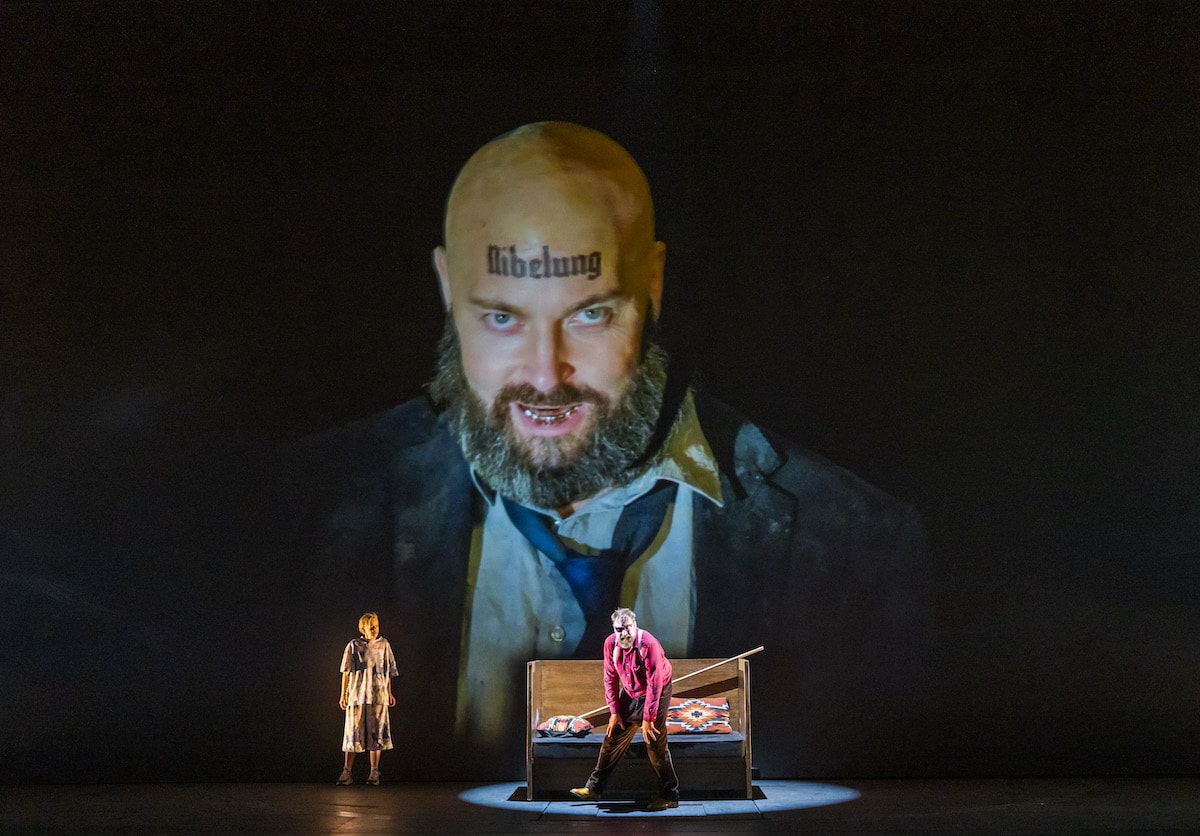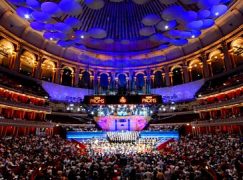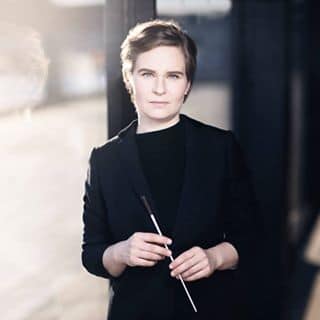Is it too late to save English National Opera?
NewsA month ago, it looked all up for ENO.
Arts Council England, facing the need to make cuts of between 10 and 20 percent, had earmarked London’s second opera house as a prime target. ENO, it was argued internally, had ceased to be a full-fledged opera company, renting out the Coliseum for much of the year to stage musicals. Its infrequent productions were unimposing, its management style abrasive and its public profile invisible. Cut.
In a last-ditch effort to save its grant, ENO disposed of its chief executive Stuart Murphy, a long, slow farewell that will resolve nothing. Fault for the decline lies with the board, chaired by Harry Brunjes, and no heads have yet rolled around that table.
The question that keeps arising at ACE is: what is ENO for?
It is not, as intended, a Komische Oper on the level of Vienna and Berlin. It is not national because it never leaves London and it is hardly doing any opera. Nor is it finding the level of private support required to sustain it without state funding. As for being a finishing school for promising UK singers, few in recent years have come through its crucible.
The best opera brains in Britain are now pondering how ENO might be bailed out or reconfigured.
They have until Friday, judgement day, to come up with a convincing plan.
Watch this space.






“Disposed of”???
He is serving the full length of his contract and doing an extra few months on top. That comes across to me as the conduct of a man who sees little future for the company, but wants to leave it in the best shape that he can.
It’s just such a pity that he didn’t take the pharmacist Chair with him. Dr Brunjes may have been successful at his day job but he and his board have all but completely ruined a once great institution.
A building it can afford to maintain would be a good start. Something about the size of Glyndebourne. It would have the added benefit that productions for the smaller theatre would transfer more easily to other theatres.
I pretty sure that it was Mr Lebrecht who reported years ago that ENO was not allowed to tour.
As ACE is not above direct interference, why not come up with some positive ideas. Help ENO dispose of the Coliseum perhaps? Would ALW be interested?
Despite all that, I have always loved ENO, and enjoy opera in English, the language of mostly an English-speaking audience. It is also affordable at £12 a seat. I used to take large groups to ENO from 1998 until 2012 with a meal next door on the way in Spaghetti House. I was not paid for this – and it was in order to introduce people to opera. I never could have got them through the front door of Covent Garden because of the cost, the hurdle of a foreign language, the image of opera in society, and the elite type of audience. Let’s hope Friday is a fruitful day, and we see what happens.
Agree. They are doing a lot to attract younger people at the moment too. I’m not a huge fan of translated operas but I can see that it makes it more accessible for many and ENO definitely occupies a good space not filled by ROH.
I also used to take school groups to ENO. The old arguments however, do not really stack up any more. Ticket prices for a performance of Christof Loy’s new ENO production of Tosca next week are £25-£160. At ROH for a non-starry La Boheme, they are £11-£235, with full view Amphitheatre seats at £32 and £150 will get you good Side Stalls, Stalls Circle and Balcony seats. The language isn’t a barrier when much of what is sung in English at ENO is largely incomprehensible or a poor match for the music. At ROH there are surtitles which allow you to both hear the original language matched to music and read the translation in real time. Both ENO and ROH used to tour occasionally – I saw both at Kenwood. I think ENO is hampered by the huge theatre which is can never fill yet needs a central London home. I’m not sure what its purpose is nowadays. For ‘cheap’ opera, people just go to cinema screened performances now. I went to my first opera for my 10th birthday. It was at Sadler’s Wells, in English, although I read the programme to see what was going to happen and don’t remember understanding much if any of the singing. I took my late wife to see her first opera when we were passing the Coliseum after a day out in town and I asked if she would like to go in. We got £10 standby tickets in the Stalls, surrounded by very dressed up people when we were in jumpers and jeans. Yes, we also used to eat regularly at the Spaghetti House, sad loss and nowhere now as good value and of quality around there.
Yes Spaghetti House much missed! The fact is a huge majority of people now will not come to see opera in original language. The reason it was written in the original language is that was the audience’s language. Wagner would be appalled to know people in the ROH are sitting pretending to understand the German or reading it on surtitles instead of hearing his work in their own language. And many of the shows ENO does are in their original language – English ! I would disgree with you that you can’t hear the text – we are always as we get older eager to blame everything for our own ears getting harder to hear IMO. as a fluent speaker of German and French I go to opera in those languages all the time and can’t understand a word unless I look at the surtitles- its much better at ENO as they know we are all listening and can understand.
I also don’t know why people keep saying that the Coli is too big – when I have been there recently (weekends and matinees) they have been nearly sold out ! There are more people going to see ENO perform in any other theatre in the West End ! And of those people 50% haven’t been to an opera before ! Where are the next generation of operagoers going to come from ? Not the ROH ! And not from cinema performances – its terrible to say those can replace live art in my opinion- though I respect your point.
I think your information about tickets is not up to date. Cheapest tickets for a first run cast at ENO is £10 for everyone. Under 21’s can go for free to the Coli every show – including the best seats. Under 35’s £15.00 each or 75% off any other tickets. Of course there are the top price tickets as well – that is only right for a going concern. The ENO really disadvantage themselves financially in giving quality seats away for nothing or very little. And you can see the results in the audience- it looks like London in age and diversity and income- not like the privilege, the tourists and the oligarchs in the ROH who sleep and eat sweets through the shows.
Forgive me for correcting you but I don’t want people to be put off the most accessible opera house in the UK for price reasons when they can even go free!
“There are more people going to see ENO perform in any other theatre in the West End ! ”
Find that hard to believe, proof?
I have a different opinion to you and that’s fine. I took the ticket prices from the ENO website as I was typing ym reply, so I dispute they are out of date. I did not look at concessions for either house, and I addressed the issue of restricted view seats for ROH which bumps up the lowest full price ticket. The disparity between a world class cast and company and the ENO is not as wide as it once was or is perceived. If they are filling houses most nights (which the finances of opera requires), then their financial situation ought not to require reducing opera performances to a fraction of performing nights. If ENO is giving away huge numbers of tickets free or at 25% of the price to anyone under 35 that is a hugely laudable social enterprise but they are possibly the only company in the country to do so and it further removes the company from a sound commercial financial model.
Ticket prices are indeed deal breakers. But people need to understand that opera is a HUGELY labour intensive and infrastructure hungry endeavour. That all costs. It’s not for nothing that opera originated in the wealthy city states of Italy.
Indeed and perhaps makes it more surprising that ticket pricing between the world-class (and cost) casts and production costs of the ROH are less than one might imagine are those for ENO.
With the proliferation of opera festivals in summer casting up and coming singers in interesting productions across a wide repertory, the case for ENO has become even less compelling …
Duh, of course, because, as is common knowledge, singers hibernate for the rest of the year.
Country house opera is all well and good for the wealthy retired, but are all but unaffordable and inaccessible to normal people.
As a retired person I assure you I’m “normal”!! But the point you make about costs is a valid one.
Before people suggest that government needs to be doing more of the heavy lifting spare a thought for the increasing burden on the taxpayer already for absolutely everything and anything that is socially ‘worthy’ these days. There’s a tipping point and it has been reached with staggering sovereign debt.
Yes, but as pointed out already, arts spending is tiny compared with, say, defence procurement, which has been badly mishandled for years.
The damage imposed will be out of all proportion to the savings obtained, and the damage would not (IMO) be reversed by increased spending in subsequent years. That, in any case, is unlikely to happen – almost a ‘reverse ratchet’ effect – down down down until it is gone.
We need faith that the arts are important. It’s not like counting the number of tanks, or GP appointments. Politically, I’m not a fan of Angela Rayner, but I admire her for sticking to her guns and turning up at Glyndebourne of all places – effectively saying ‘Why the hell not?’. Good for her.
Many or most of the tickets given away for free, but prices sky high for those who pay. And I’m not a fan of singing in translation: super-titles make it pointless, and the words are a key part of the opera.
Norman is entirely right to blame ENO’s Board for the potential closure of England’s national opera company.
The horror began 10 years ago when an appalling season led to a massive financial deficit.
The Arts Council piled on the misery with the punishment of a £5 million grant cut (roughly one-sixth of ENO’s income).
Typically, the Board over-reacted. They appointed a consultant, with zero arts management experience, as CEO.
She cut the number of Coliseum productions in half, reduced the Chorus to part-time and lost a world-class Music Director (Mark Wigglesworth) in protest.
Audiences collapsed alongside box office and fundraising income.
The result was to massively reduce ENO’s very raison d’etre. With that gone, closure via an Arts Council grant loss became almost inevitable.
The Board responded with further monumental stupidity. The new strategy, under Stuart Murphy, was all sparkle and no substance.
Pack ENO productions with C-list celebrities and hope no one notices the collapse in the quantity and quality of productions.
ENO’s only hope is the mass resignation of the entire Board and the company run by a relatively successful organisation such as the South Bank Centre or the Barbican.
No civilised country in Europe would allow its national opera company to be so serially abused by leadership worthy of a lemming facing a cliff-edge.
Successful organisation such as the South Bank Centre?! It only survived financially by building food court restaurants around itself. Classical music concerts are deprioritised in a classical concert venue and it serves as a market venue, creche, free local resident wifi hub and skate park for most of the time. Concertgoers are made to feel unwelcome (ever tried to find a table, or even somewhere to sit before a concert?)
Yes.
Looking at the list of ACE Portfolio Organisations, I see that the South Bank Centre is second only to the ROH, receiving £18,697,824 pa. And that excludes the National Theatre next door – another £17,007,280. Now I’m not an expert on the structuring of the SBC, but I’m at a loss to understand why this is funded by ACE.
The Barbican Centre gets just £488k, the Corporation of the City of London being the local council responsible. Why isn’t the GLC (or whatever it calls itself now) paying for the SBC? Perhaps I’m missing something obvious.
The ROH is an international opera house and covers two national companies. It also raises around 75% of its funding privately. Not bad. Poor management at ENO notwithstanding, it seems to me that opera is not the main problem.
I cut my opera teeth with the ENO in the early 1990s. I would go sometimes up to three times a week and sit in the Gods for next to nothing. There was a clear policy of ensuring that the bread and butter operas – Tosca, Figaro, Magic Flute, madam Butterfly, Rigoletto etc – were in easy to follow well produced and easy to revive productions by excellent directors. These filled the theatre and built up public trust so that they were also able to put on more esoteic operas that were not often produced, which were also then well attended because the ENO had built up brand loyalty. This started to fall apart when the bread and butter opera productions (which the company was dependent on to bring in the revenue) were replaced by inexperienced directors who directed productions that failed at the box office and failed therefore to be revived.
It is not the theatre that is the problem – I regularly had to get standbys back in the early 90s. The ENO took the brand loyalty for granted, became complacent and lost the good will of their audience. Once you lose the trust of your audience, it is very hard to get it back. It requires going back to the basics and offering well directed, consistent productions that will be able to be revived, with singers at the beginning of their careers cutting their opera teeth. It will require investing in education, digital platforms and building up once again a house style that people will buy into, like they did back in the 1990s.
Whatever happened to ENO it let many things happen that are beyond comprehension: they stopped caring about their
email newsletter (to this day I don’t know why they stopped it or why they dropped me out of it), they abandoned live broadcasts when they were taking off elsewhere and devalued the venue by allowing performances of dubious artistic value to be staged in the Coliseum (the mystique of a venue of that kind should be preserved, it could have been used to host foreign opera companies, orchestras and other performers better aligned to a high culture ethos, but allowing frankly preposterous musicals devalued the venue’s reputation).
As for singing in English, well, I became convinced that’s silly when it comes to certain languages. Italian and French operas? Absolutely not. German? Maybe. Czech and Polish? Yes.
The focus should have been actual operas in English, some of the best opera experiences in my life were Akhenaten, Satyagraha, Peter Grimes performed at ENO, there are many operas in English that could have found their natural home in the Coliseum but unfortunately management never had a vision of that kind, it all came to a ludicrous stop when that young woman whose name I can’t remember was given free reign having zilch expertise about running a major cultural institution.
The clue was and still is in the name.
Gosh, this reads like an obituary unfortunately.